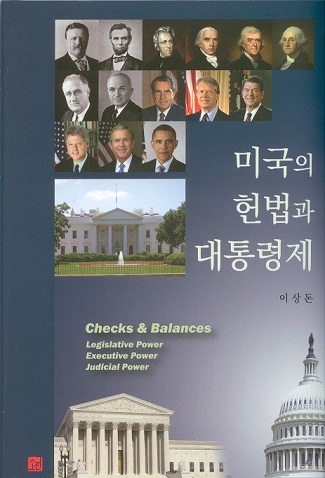이상돈
LEESANGDON
나라와 사회를 올바르게 세우기
위해 노력하겠습니다.
나라와 사회를 올바르게 세우기
위해 노력하겠습니다.

<Korea Times> Jan 10, 2013
U.S. influence on S. Korean politics examined
The Constitution of the U.S. and the Presidential Government
By Lee Sang-don
Sojin Publishing Co.
America’s constitutionalism and the principle of checks and balances have offered crucial guidance for many nascent democracies around the world, including South Korea decades ago.
In his new book, “The Constitution of the U.S. and the Presidential Government,” Lee Sang-don, law professor at Chung-Ang University, delineates how the U.S. legal and political systems have taken root and evolved, and affected South Korea.
The 261-page volume written in Korean is a collection of seven academic papers and other articles Lee has penned since 1984 while lecturing on international environmental law, economic law and other legal subjects at the university in Seoul.
The first chapter touches on the U.S. influence on South Korea’s constitutional framework. It depicts trials and errors South Korea went through before its governance structure took shape.
Under the yoke of the military dictatorship in the early 1970s, Korea had difficulty accommodating America’s constitution with the political elites interpreting it arbitrarily and academia having an inadequate grasp of it, the book explains.
The book also explores the origin of America’s presidential system and its evolution through ups and downs. With power overly concentrated on the president, there was public criticism for the “imperial presidency” in the U.S. as well. How to curtail presidential power was one of the key campaign issues ahead of South Korea’s presidential election last month.
The chapter on the U.S. president’s war authority highlights the long-standing tension between the president and Congress, which in 1973 led to the congressional approval of the “War Powers Resolution” designed to curtail the president’s power to commit U.S. forces to an armed conflict without congressional consent.
Although the passage came amid public distrust following the country’s defeat in the Vietnam War, the law raised concerns that it would restrain the leader’s capability to promptly respond to military contingencies overseas, the book points out. Amid controversy over its constitutionality, the law has largely been ignored.
The author also investigates Korean political circles’ ongoing discussion over the “open primary system.” Citing a set of legal disputes in the U.S., the author cautioned the system could cause a range of problems such as undermined rights of party members.
The book also draws lessons on state-by-state presidential nomination procedures; the electorate college system, its demerits and efforts to overcome them; and presidential authorities including signing international treaties.
In December 2011, Lee was appointed as a member of the Saenuri Party’s emergency committee to revamp the party hit by political funding scandals. The reform efforts resulted in its surprise victory in the parliamentary elections last April.
Lee obtained his bachelor’s and master’s degrees from Seoul National University in 1974 and 1976, respectively. He studied environmental law and received his doctorate from Tulane University in the U.S. in 1983. Lee has written more than 100 academic papers since he became a professor, more than half of which are dedicated to environmental law.
By Song Sang-ho (sshluck@heraldcorp.com)